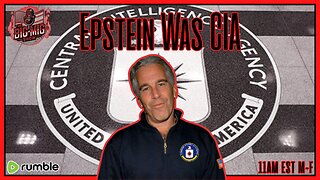Premium Only Content

Pirate Latitudes: Michael Crichton’s Swashbuckling Dive Into Golden Age Piracy
**DONATE HERE IF YOU WISH TO HELP FUND THIS PROJECT: http://ko-fi.com/bibliocultist**
In this video, I dive into Michael Crichton's posthumous novel 'Pirate Latitudes', a thrilling adventure that blends historical accuracy with engaging storytelling. Crichton's masterful ability to immerse readers in the world of 17th-century piracy shines through, offering a vivid portrayal of colonial life, naval warfare, and the intricacies of seafaring during this era. The book's educational value is noteworthy, providing fascinating historical details that bring the period to life. While praising Crichton's storytelling technique and his skill in blending fact with fiction, I also touch on some areas where the novel feels potentially incomplete or rushed, likely due to its posthumous publication. Overall, 'Pirate Latitudes' stands as a testament to Crichton's talent for crafting historically rich, entertaining narratives that transport readers to another time and place.
*all music and content copyright BiblioCultist.com*
#MichaelCrichton #PirateLatitudes #HistoricalFiction #BookReview #Piracy #ColonialEra #NavalWarfare #SirFrancisDrake #EnglishSpanishRivalry #PosthumousNovel #booktube #books #biblio #cultist #booktok
**SHOW NOTES**
1. Michael Crichton (1942–2008) was an American author, filmmaker, and physician best known for his gripping techno-thrillers that blended science, adventure, and meticulous research. A Harvard Medical School graduate, he revolutionized popular fiction with bestsellers like Jurassic Park (1990) and The Andromeda Strain (1969), often exploring themes of human ingenuity clashing with uncontrolled innovation.
2. Michael Crichton anchors his adventure in documented history: it features real figures like Sir Thomas Modyford, the English governor of Jamaica who licensed privateers (including Henry Morgan) to raid Spanish colonies, and Edward Mansvelt, a pirate captain whose 1666 attack on Costa Rica inspired the novel’s siege of Matanceros. The book references actual court cases, such as the trial of pirate Joseph Bannister, who escaped Port Royal’s gallows in 1684—mirroring the novel’s corrupt legal intrigues. Even the Cimarrón (enslaved Africans turned rebels) and Spanish Inquisition threats reflect 17th-century Caribbean dynamics. While protagonist Captain Hunter is fictional, his exploits echo real privateer tactics: ambushing treasure fleets, bribing officials, and navigating Jamaica’s gray zone between legality and piracy under Charles II’s tacit approval.
3. The novel’s reference to female criminals being transported to the Caribbean reflects a grim historical reality: under England’s 17th-century penal system, thousands of women convicted of petty crimes (theft, vagrancy, or moral offenses) were forcibly shipped to colonies like Jamaica as indentured servants. With few survival options, many fell into prostitution—especially in ports like Port Royal, where male settlers and sailors outnumbered women 3-to-1. Official records, such as Bristol’s "Transportation Books" (1654–1700), confirm this practice, and contemporaneous accounts (e.g., A Brief Description of Jamaica, 1688) describe brothels staffed by ‘transported wenches.’
4. The enmity between Spain and England during the piracy era stemmed from deep-rooted political, religious, and colonial rivalries. The conflict intensified after Henry VIII’s break with the Catholic Church (1534), positioning Protestant England against Catholic Spain. Tensions escalated under Elizabeth I, culminating in the failed Spanish Armada (1588), where Spain sought to invade England and restore Catholicism. Colonial competition further fueled hostilities, as both nations vied for control of the New World’s wealth, particularly gold and silver from Spanish galleons. English privateers like Francis Drake and Henry Morgan were celebrated for raiding Spanish ports, while Spain branded them pirates. By the 17th century, this rivalry made the Caribbean a battleground, with Jamaica’s Port Royal becoming a hub for English privateers targeting Spanish ships and settlements.
5. Sir Francis Drake (c. 1540–1596) was an English sea captain, privateer, and naval commander who became a legendary figure of the Elizabethan era. Renowned for his daring circumnavigation of the globe (1577–1580)—the first by an Englishman—Drake earned fame and knighthood for plundering Spanish ships and settlements in the Caribbean, notably the 1573 raid on the Spanish Silver Train and the 1580 capture of the treasure-laden Cacafuego. As a key commander against the Spanish Armada (1588), Drake’s exploits epitomized England’s naval ascendancy and Protestant defiance of Habsburg Spain. Though celebrated as a hero in England, Spain branded him "El Draque" ("The Dragon"), a pirate and heretic. His raids laid the groundwork for England’s colonial ambitions in the New World.
-
 LIVE
LIVE
LFA TV
18 hours agoBREAKING NEWS ALL DAY! | THURSDAY 9/25/25
4,677 watching -
 UPCOMING
UPCOMING
Trumpet Daily
16 minutes agoTrumpet Daily LIVE | Sept. 25, 2025
-

Benny Johnson
2 hours agoPANIC: James Comey Indictment IMMINENT, Faces PRISON | Letitia James, John Bolton Next, Trump CURSE
35.4K26 -
 1:00:18
1:00:18
VINCE
3 hours agoHow Many More Tragedies Before A Change Is Made? | Episode 133 - 09/25/25
238K69 -
 1:14:02
1:14:02
theoriginalmarkz
2 hours agoCoffee with MarkZ. 09/25/2025
10.3K -
 LIVE
LIVE
Badlands Media
7 hours agoBadlands Daily: September 25, 2025
3,723 watching -
 LIVE
LIVE
The Big Mig™
2 hours agoEpstein Was CIA & Who Is Trump Protecting?
6,196 watching -
 LIVE
LIVE
Chad Prather
1 hour agoChristian Youth Coach SHOT In Texas While Praying W/ Team! + Megyn Kelly DESTROYS Libs On TPUSA Tour
494 watching -
 1:45:33
1:45:33
Dear America
3 hours agoPOLITICAL VIOLENCE MUST END!! First Charlie, Now ICE…
144K52 -

Wendy Bell Radio
6 hours agoBLOOD ON THEIR HANDS (NEW)
47.5K113